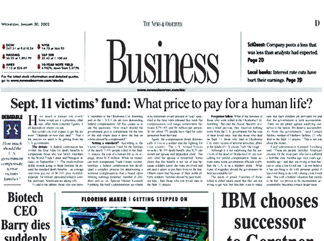|
There’s no business like not minding your own
business:
Hopping aboard the corporate money-go-round
Gaston de Rosayro
 Writing
a business story Writing
a business story |
Business sections have become an integral part of most newspapers.
Radio and TV bulletins also devote special news slots for economic news.
Many newspapers call their separate business pullouts Finance, Economics
or Business. Call it whatever you like but it all revolves around what
the world revolves around - Money. Today let us discuss ways of
simplifying the news gathering and writing of stories about business and
money along with a short glossary of economic terms.
This is an increasingly important field of journalism, and covers
such areas as industry and agriculture, commerce, finance, tourism,
housing and construction and economics. Simply put, draws a picture of
the ways wealth is created and distributed. It is important to readers
and listeners, even though they may only be interested in knowing about
wage or price rises, house buying or currency exchange rates.
Although at first sight it may seem a very complicated area - full of
theories, rules and numbers - you can report it well as long as you
remember some simple principles. But first it is better to understand
the basics. As in any specialist area, there is a basic core of
knowledge which you must understand before you can write competently.
You do not need to know every aspect of economic theory or possess a
degree in business studies, but it is not possible to be a competent
journalist without the ability to understand a simple balance sheet or
explain profit and loss.
Once you understand the basics, you can ask other people to fill in
details. Then you can explain what happens in the financial world in a
way your readers or listeners can understand.
|

A business section of a newspaper |
Remember to report the human face. Because economics is about human
actions, it should be possible to tell all economic news stories in
human terms. If it is not possible, you must question whether you should
really use the story at all. For example, a story about an increase in
import duty should not be written in terms of financial policy, but in
terms of what it will mean to your readers or listeners who buy imported
goods. For instance there is a right way and a wrong way of reporting
price hikes, of say consumer goods. This is the right way of reporting
such a story:
“The price of sugar could rise by as much as 20 rupees a kilo from
next week. The Government wants to increase the duty on imported refined
sugar by 15 percent, to protect local industry.” And here is how not to
report such a story: The Government is to increase the duty on imported
sugar by 15 percent. The increase is an attempt to protect local growers
from cheap imported sugar.
Of course, simplification should not be taken too far. There are some
economic issues which affect society as a whole and need serious
treatment. It would be an over-simplification to view a plunge in the
exchange rate of your currency only as if it will make travellers'
cheques more expensive. There would be much greater consequences, both
good and bad, such as a rise in the cost of imports and a boost to
export industries.
Even these more serious effects should be put in human terms. The
travellers' cheques aspect is a very minor side effect. The cost of
imported goods on shelves and in showrooms is the right angle.
Economics is often expressed in terms of cooperation or competition
between nations. Economic stories on the major international wire
services are usually written from the viewpoint of the major developed
nations (and figures are usually quoted in United States Dollars). You
have to avoid presenting the issues through the eyes of foreigners.
Your readers or listeners will usually be interested in the economic
effect on their own country. Many economic concepts are quite
complicated. You should lead your readers or listeners gently but firmly
through your explanation. Your job will not be helped if you scatter
numbers through the story like rocks on the path. Your readers or
listeners will be held up whenever they stumble over a difficult number.
In the discussions on news writing, we suggested that two or three
concepts or ideas were the most that readers or listeners can handle in
each sentence.
Each number in an economics story must be regarded as an extra
concept because the readers or listeners have to think about it
separately before continuing their understanding of the sentence.
Your task is to select only those numbers which are most important -
those which tell the story best - and then spread them throughout the
story. Do not pile them like a barrier of rocks across the first
paragraph.
|

A business news report |
In radio especially, you should never give your audience complicated
sums to do during news stories. They will either fail to do them and so
miss an important aspect of the story, or they will be so busy doing
mental arithmetic that they miss the rest of the bulletin.
You should have the figures in front of you as you write the story.
Do the sums before you present the information. Money figures and
fractions are usually easier to grasp than percentages. Remember that
rounded figures are much easier to understand than long strings of
numbers. Almost two thousand is easier to grasp than 1,963. Instead of
saying "wages will be cut by 50 percent", say "wages will be cut in
half". Instead of "the price of Gurgles soft drinks is to rise by five
percent on June the first", say "Gurgles soft drinks will rise by five
rupees a litre bottle next month".
Whenever you deal in figures, try to visualise what each of the
numbers means. This will help you gain a complete picture of the way the
finances fit together. See if the numbers make sense by working them out
into meaningful units. Visualising the figures also helps you question
people's claims.
The world of commerce and economics, like politics and science, is
full of specialist words we call jargon. These are phrases which mean a
lot to those who use them every day. They do not, however, help your
readers or listeners to understand what can already be complicated
ideas.
Sometimes jargon is too long and can be easily shortened - 'a medium
of exchange' becomes 'money.' Sometimes jargon is a shorthand for a
longer concept and needs explaining in more detail - "hot money" becomes
"money coming into the country to take advantage of high local interest
rates." If you get jargon in a press release, do not hesitate to go back
to the source for an explanation. If you do not understand it, there is
a good chance that many of your readers or listeners will also be
confused.
To summarise: You must understand the basics of economics and finance
before you can report effectively. Try to write your stories with a
human face, in a way your readers or listeners can easily understand. Do
not overload your stories with figures. Avoid economic jargon where
possible. If you must include technical terms, always explain them. Be
fair in your reporting.
Yes it is a great feeling minding everyone else’s business except
your own and getting paid for it in the process.
[email protected]
|



